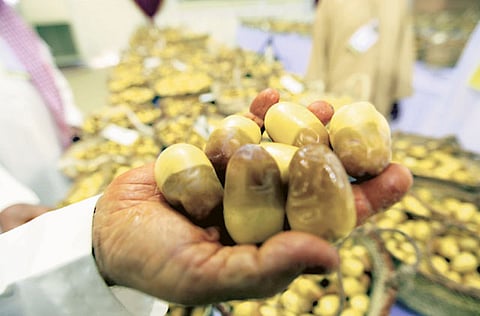An attraction for dates
UAE dates soon will be in a position to command better export prices, retailers believe

Dubai: Despite the various cultures found in the Muslim world, there is one thing certain to be found on the tables of all families at sunset during Ramadan: the traditional date.
A fruit with cultural and religious significance, the demand for dates skyrockets during this time of year. This year Ramadan is also in the middle of date season, which lasts from June to September, making it an excellent time to buy dates.
Tina Memic, a retail manager for Bateel, a gourmet date company, said the number of clients usually increases by 25 per cent during this time of year.
"The demand for dates rises enormously with Ramadan approaching. Sales usually double," she said.
Mohammad Fouad, the Dubai and Northern Emirates manager of Emirates Dates, says date sales begin to climb four or five months before Ramadan begins. During this period, local sales to supermarket chains such as Carrefour and Al Maya make up 80 per cent of the company's sales. Exports to a diverse group of countries, such as Morocco and Australia, increase up to 40 per cent.
UAE date retailers are optimistic about the progress of the domestic dates industry.
"The prospect for the domestic date industry is bright. UAE dates soon will be in position to command better export prices," said Vivek Sharma, Deputy General Manager of Sales and Marketing at Bateel.
"Clearly Dubai is being positioned as a date trading hub," Sharma said. "However since 84 per cent of the import is from Iraq, average export price is significantly lower at around $300 per tonne.
The biggest importers are India and Bangladesh. However, the UAE is yet to make its mark in the high price segment dominated by Tunisia, Jordan, Saudi Arabia and the US. The UAE produces more than 40 types of date varieties.
According to statistics from the UN Food and Agriculture Organisation (FAO), dates top the UAE's list of agricultural products — ahead of traditional camel milk and meat.
Date sales in the UAE reached 745,000 tonnes in 2009, according to the latest statistics from the Ministry of Trade. Most of the production — 94 per cent — was from domestic produce and 6 per cent was imported. In 2009, the UAE exported 266,000 tonnes of dates including 232,000 tonnes of re-exported dates.
High-tech processing facilities, government support of modern farming and the gradual shift to pre-packed and branded products are all factors in pushing the domestic industry forward but date infestation remains an issue, he explained.
Such is the popularity of dates during Ramadan that LuLu Hypermarkets recently held a date festival in association with the Ministry of Environment and Water.
Promotion
The festival, which features up to 80 varieties of fresh and dry dates, is designed to, "procure dates from local growers," in a bid to promote them, says Vijiyan Nandakumar, a spokesperson for LuLu Hypermarkets. The dates, which include popular varieties such as Al Farad, Khunaizi, and Khasb, come from farms in Abu Dhabi, Al Ain, Ras Al Khaimah, Dhaid, and Fujairah. Organic dates come from Al Foah and Al Mazaya farms in Abu Dhabi.
Although LuLu's agreement with the ministry stipulates that it purchases 100 tonnes of dates from local farmers, it aims to purchase between 150 and 170 tonnes to meet demand, which increases up to 400 per cent during Ramadan.
Al Maya Supermarkets also sees an increase of around 25 per cent in date sales, according to Kamal Vachani, the director of Al Maya Group.
LuLu are not the only retailers purchasing locally-grown dates. Forty per cent of Emirates Dates' products come from local growers in Al Ain and Ras Al Khaimah.
Sharjah Dates Factory gets 80 per cent of its products from Al Ain, according to Aali Mohammad Al Garbawi, the company's financial and administration manager. Exported dates generally come from Saudi Arabia, the world's second largest exporter of dates.
Date retailers are also promoting dates as gifts for family and friends during Ramadan. "It is a tradition to exchange gifts and celebrate [during Ramadan]," says Memic. "Even non-Muslim organisations purchase gifts to present them to their Muslim colleagues and clients."
But LuLu does not want to limit its date sales to Ramadan. Instead, it seeks to use this year's date festival to, "create a year-long market for dates," says Nandakumar. Its promotion will feature date-based products such as date honey, jam, and pickles.
"Interestingly dates coated with chocolates, popular as date-choco, is becoming a category by itself. Demand is growing and so is the export. The market is dominated by domestic producers. Global chocolate giants are yet to establish their mark," he noted.
Foreign exchange-earning potential
- 745,000: UAE date sales in tonnes in 2009
- 266,000: dates in tonnes exported by the UAE in 2009
- 232,000: dates in tonnes re-exported by the UAE in 2009
By Nadia Eldemerdash and Rohma Sadaqat, Staff Reporters



